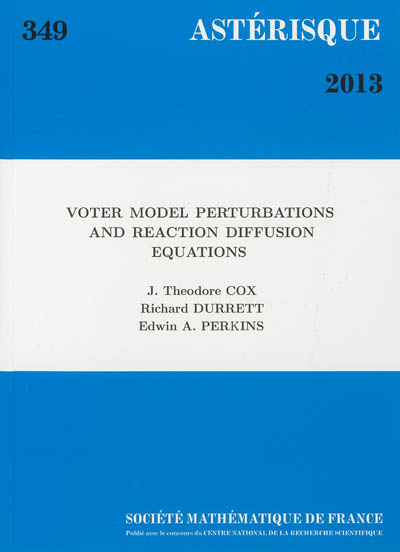en savoir plus

Carte fidélité
Permet à tous ses détenteurs d'obtenir 5% de réduction sur tous les livres lors du retrait en magasin (réduction non cumulable avec les réductions de type étudiant).
Offre également un certain nombre d'avantages auprès de nos partenaires.
Wishlist
Avec les favoris, retrouvez dans un espace les sélections effectuées au fur et à mesure de vos navigations dans le site.
Constituez pour votre usage personnel vos listes de livres en prévisions d'achats futurs et votre sélection d'articles, dossiers, événements, vidéos ou podcasts préférés ou à découvrir plus tard...
Il suffit simplement de cliquer sur "Ajout Favori" sur chaque page qui vous intéresse pour les retrouver ensuite dans votre espace personnel.
Requiert un compte Mollat
Mes Alertes
Requiert un compte Mollat
Astérisque, n° 349. Voter model perturbations and reaction diffusion equations
Auteur : Theodore Cox
Auteur : Richard Durrett
Auteur : Edwin Arend Perkins
en savoir plus
Résumé
Présentation du modèle votant et des équations de réaction-diffusion. Les auteurs considèrent des systèmes de particules en interaction, perturbations du modèle du votant. En dimension supérieure ou égale à 3, ils montrent qu'un rééchelonnement approprié en temps et en espace du système converge vers une solution d'une équation de réaction-diffusion. ©Electre 2025
Lire la Quatrième de couverture
Réduire la Quatrième de couverture
We consider particle systems that are perturbations of the voter model and show that when space and time are rescaled the system converges to a solution of a reaction diffusion equation in dimension d (...) 3. Combining this result with properties of the P.D.E., some methods arising from a low density super-Brownian limit theorem, and a block construction, we give general, and often asymtotically sharp, conditions for the existence of non-trivial stationary distributions, and for extinction of one type. As applications, we describe the phase diagrams of four systems when the parameters are close to the voter model : (i) a stochastic spatial Lotka-Volterra model of Neuhause and Pacala, (ii) a model of the evolution of cooperation of Ohtsuki, Hauert, Lieberman, and Nowak, (iii) a continuous time version of the non-linear voter model of molofsky, Dirrett ; Dushoff, Griffeath, and Levin, (iv) a voter model in which opinion changez are followed by an exponentially distributed latent period during which voters will not change again. The first application confirms a conjecture of Cox and Perkins (« Survival and coexistence in stochastic spatial Lotka-Volterra models », 2007) and the second confirms a conjecture of Ohtsuki et al. (« A simple rule for the evolution of cooperation on graphs and social networks », 2006) in the context of certain infinite graphs. An important feature of our general results is that they do not require the process to be attractive.
Fiche Technique
Paru le : 25/04/2013
Thématique : Statistiques
Auteur(s) : Auteur : Theodore Cox Auteur : Richard Durrett Auteur : Edwin Arend Perkins
Éditeur(s) :
Société mathématique de France
Collection(s) : Non précisé.
Série(s) : Non précisé.
ISBN : 978-2-85629-355-3
EAN13 : 9782856293553
Reliure : Broché
Pages : 110
Hauteur: 24.0 cm / Largeur 18.0 cm
Poids: 0 g
